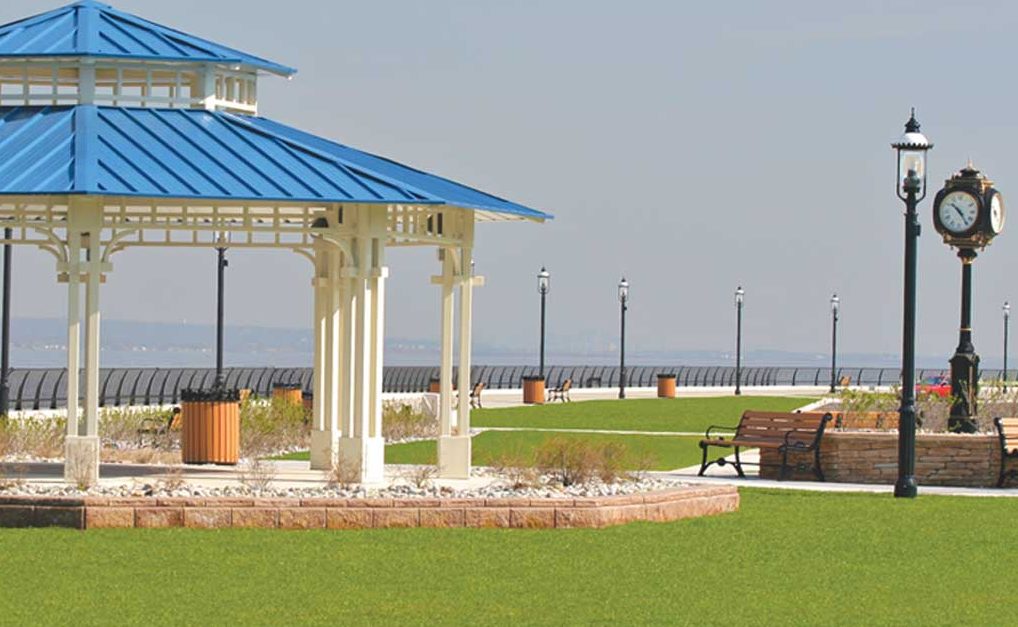Municipal officials were expected to vote this week on a developer’s request for a tax break that would permit the construction of a 120-unit apartment building to move forward in Keyport.
At a Keyport Borough Council meeting on Dec. 4, members of the governing body were scheduled to consider a payment in lieu of taxes (PILOT) agreement with Mariners Village at Keyport Urban Renewal LLC.
Clay Perlman’s $37 million redevelopment plan has been approved by the Keyport Planning Board, municipal officials said. Perlman plans to construct a four-story apartment building on a partially vacant waterfront property near Brown’s Point Marina, 357 W. Front. St.
At issue is a 25-year tax abatement, also known as a PILOT agreement, requested by Perlman. The Dec. 4 council meeting was held after the deadline for this issue of the Independent.
On Nov. 27, during a special meeting of the council, municipal officials held an information session which offered members of the public the opportunity to ask questions about the proposed PILOT agreement.
Business Administrator Stephen Gallo, who said the redevelopment initiative would contribute “a new source of income” for Keyport, said, “When we received the request for a (PILOT), we didn’t just take (the developer) at their word when they said they needed this.
“We hired our own financial expert to analyze the data that was presented to determine if such (financial) support is required for the project to actually be financed … (The project) has to deliver an adequate rate of return or the bank won’t finance it,” Gallo said.
Dennis Enright, who is Keyport’s independent financial adviser, Joseph Bauman, representing the redevelopment council, and attorney Robert Beckerman, who represents Perlman, attended the special meeting.
Gallo said the PILOT agreement, if approved, would not mean the applicant is exempt from paying property taxes entirely once the project is complete.
“(The developer) will pay exponentially more in property taxes under the tax agreement. The project, even with the tax abatement, will pay significantly more in local property taxes than (is paid) today.”
At present, the owner of the West Front Street property pays between $88,000 and $90,000 annually in property taxes, Gallo said. He said the initial PILOT payment, if approved by the council, would be $319,000.
Gallo said the revenue Keyport would receive from the PILOT payment would be used to help fund municipal operations.
The owner of the waterfront property, who Gallo did not name, has been actively engaged in pursuing a developer to revive and repurpose the property. Gallo said the apartment project has been discussed at 22 public meetings since December 2015.
He said the Keyport School District will not be impacted if a PILOT agreement is granted by municipal officials. Gallo said 15 percent of the revenue from the tax abatement, if approved, would go toward the school district.
Gallo said the redevelopment initiative could help boost economic growth in Keyport and encourage new residents to spend money at local retailers.
“The surest way to incentivize business it to provide (businesses) with customers,” he said.
Gallo said new residents should be welcomed into the community. He said Keyport would not be overcrowded even when the apartment building reaches full occupancy.
According to the 2010 Census, Keyport had a population of 7,240 residents. The 2017 estimated population for the borough was 7,085 residents.
Residents asked why a tax abatement for five or 10 years was not on the table. They said a 25-year tax break for the developer seemed significant.
Officials said a 25-year tax abatement was the best course of the action for Keyport.
Kenny Schwartz, a 26-year resident who said he has 14 mortgages in town, supported the PILOT agreement, saying, “I need people with more credit cards, with more wallets, because I have many commercial tenants who subsidize their rent … I would love to see somebody who is really taking a risk. This (redevelopment) is a big risk … I think this is one of the most beautiful, greatest projects I’ve ever seen in Keyport.”
In an interview following the meeting, council President Matthew Goode said, “Here there is a site that is mostly vacant and underused, so when the developer came forward with a plan to redevelop the site with high-end rental units, the Borough Council believed there was a certain benefit to the town, namely additional residents to shop in our beautiful downtown, as well as to generate significant amounts of otherwise unavailable municipal revenue.
“Because the size and scope of this type of project has not previously been attempted in Keyport, the developer explained there was a certain amount of increased risk involved that would preclude the development of the project without the relative stability and predictability a PILOT agreement brings. The PILOT agreement would thus make the project more attractive to investors and lenders and increase the likelihood of success,” Goode said.
Goode, who said he could not speak on behalf of his fellow council members, said he is in favor of granting the developer a 25-year tax abatement.
“As for myself, our experts have said the PILOT agreement is necessary for the project to be built. Keyport is an incredible town with many friendly, generous and civic-minded people.
“This is an opportunity to attract new residents to enjoy all Keyport has to offer, while at the same time generate a significant amount of revenue that would be able to offset and/or stabilize our municipal taxes.
“In my eyes, this project would ultimately benefit the borough and its residents, and we should endeavor to assist in making this project happen,” Goode said.
According to a report posted on Keyport’s municipal website, the planned luxury four-story building will include 40 one-bedroom apartments and 80 two-bedroom apartments to be rented at market rates. The building will have 175 parking spaces on-site.

